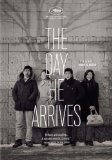| Reviews & Columns |
|
Reviews DVD TV on DVD Blu-ray 4K UHD International DVDs In Theaters Reviews by Studio Video Games Features Collector Series DVDs Easter Egg Database Interviews DVD Talk Radio Feature Articles Columns Anime Talk DVD Savant Horror DVDs The M.O.D. Squad Art House HD Talk Silent DVD
|
DVD Talk Forum |
|
|
| Resources |
|
DVD Price Search Customer Service #'s RCE Info Links |
|
Columns
|
|
|
Day He Arrives, The
THE MOVIE:
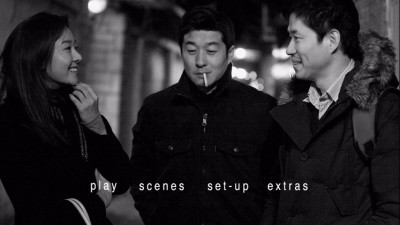
Seongjun is a filmmaker who made four films before abandoning the craft and becoming a professor at a small school in the Korean countryside. On the occasion of The Day He Arrives, the latest from Hong Sangsoo (Woman is the Future of Man), the emotionally wounded artist (played by Yu Jun-Sang) has returned to Seoul to visit a friend, Youngho (Kim Sang Jung). On that first day, the friend is nowhere to be found, and so Seongjun wanders his old stomping grounds, running into an actress he knows, drinking with some film students, and when deep in his cups, visiting his ex-girlfriend, Kyungjin (Kim Bo-Kyung). There is still pain between them, and also some love, though when she sends him away, it seems for the best.
When we see Seongjun again, it's the next morning, and he is back on the hunt from Youngho. If the circumstances look the same, it's because they are. The Day He Arrives, for the purpose of this film, is every day, and every drunken night gives over to the same hungover morning. Seongjun realizes it...and he doesn't. The only time he acknowledges the passage of days, it's when he runs into the actress again. He remembers seeing her the day before, and she remembers seeing him. The air around her is different.
On day 2, Seongjun connects with his friend, and they go out together, hooking up with his colleague, a woman named Boram (Song Seon-Mi). Youngho and Boram are film professors, as well, and they teach together in Seoul. Boram is attracted to Seongjun, she likes his films, and she's curious about his broken heart. He is distracted, however, when they go to a bar called Novel, and the pretty owner turns out to be a dead ringer for Seongjun's ex-lover. Indeed, in a move reminiscent of Bunuel (or perhaps Lynch), Kim Bo-Kyung also plays Yejeon. The director is drawn to this woman, the coincidence is too overpowering. It must mean something, right?
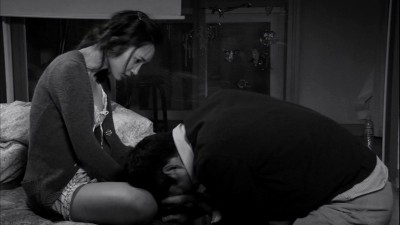
This is the central philosophical question that Hong Sangsoo sets out to examine in his mesmerizing drama. The repetition of events in The Day He Arrives is not an empty gimmick, it's a considered choice that has been undertaken with purpose. As each new version plays out, different things happen. On day 3, an actor friend joins the group. Seongjun also makes progress with the bartender. On day 4, Youngho is drunk and reveals himself a little more. Each character is getting a kind of do-over. They take more risks, speak more truths, and essentially get at what they are trying to get at.
I suppose how you interpret the changes and escalation is going to determine how you assess The Day He Arrives. It may also be a personality litmus test. The liner notes to the film, written by critic James Quandt, are titled "Déjà Vu," but I think that's too tidy a concept for the existential riddle that Hong is posing. His main character sets the parameters when he says he doesn't believe that coincidence has meaning. Life is a series of random events, and we spend so much time trying to connect them, we risk missing that there is only one inevitable outcome. Whatever circumstances keep bringing these people together, whatever common thoughts drive them (throughout the movie, conversations are repeated with speakers switching roles and/or echoing each other in the discussions), this is all chance. For the optimistic among you, the repetition of these happenings ultimately puts luck on your side. In a kind of Groundhog Day romantic scenario, the characters can get better, do better, and get closer to some kind of true connection. If you're pessimistic like me, the randomness only proves to emphasize how alone we, as humans, really are. Every day, Seongjun gets to know the barmaid a little better, gets to like her more, and eventually succeeds in being with her...only to let his own emotional dysfunction dictate his next move. It's like the old saying goes, no matter where you go, there you will be. Seongjun can't help but be alienated. He is eternally the outsider, always arriving, never staying.
The Day He Arrives, for all its long scenes of conversation, is a tightly edited film. For its surreal concept, it's also surprisingly grounded. The acting and the writing are naturalistic. Hong never forces the drama, nor does he spell out his intentions through overly explanatory or self-reflexive dialogue. Instead, his references are subtle, and he lets the actors be themselves within the scene, lets them find the truth. The camera probes occasionally, moving in tighter on a moment when further intimacy is required, but otherwise it's unobtrusive. We hang back and watch, we aren't pushed into the center of the intellectual mystery. This, of course, makes it all the more intriguing. Hong seduces us with the unknowable, and it's hypnotizing. Even as we begin to discern the magician's tricks, the illusion is never dissolved--meaning we are there wholly and completely when the final devastating day comes at last.
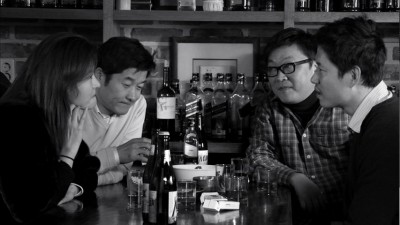
THE DVD
Video:
Shot in digital, The Day He Arrives makes a smooth transition onto DVD. The black-and-white image is shown in anamorphic widescreen, framed at what appears to be 1.77:1, and not the 1.85:1 indicated on the back cover (thanks to my colleague Christopher McQuain for spotting this; for the record, IMDB lists the film as 1.85:1, too). The picture looks good, with apparent texture and HD-level clarity that appears to match the intention of Hong Sangsoo and director of photography Kim Hyung-Ku without giving it that overly clean, smoothed out digital look. Edges are sharp, with only light fuzz and the occasional ghosting, all of which could be a byproduct of the shooting method as much as an issue with the DVD.
Sound:
The original Korean soundtrack is mixed in Dolby Digital, with the stereo track providing a subtle background atmosphere for all the conversation to play across. The Day He Arrives is mostly dialogue driven, and so that is given priority in the mix.
The English subtitles, presented in white, are always easy to read, and though the writing comes off as slightly stiff at times, the translation gives a good sense of character.
Extras:
As mentioned in the main body of the review, The Day He Arrives is packaged with an accompanying insert with liner notes by James Quandt.
There are also two strong extras on the DVD itself: an hour-long chat between the director and film critic Tony Rayns and a video essay by Kevin Lee. Rayns does a good job of drawing out what he can from Hong Sangsoo, who it seems is not exactly comfortable talking about himself. The conversation was taped the year prior to The Day He Arrives, so the film never comes up. This leaves Lee to do the heavy lifting in terms of dissecting the film itself. His featurette is well worth your time.
The theatrical trailer for the film is also included.
FINAL THOUGHTS:
Highly Recommended. Hong Sangsoo's 2011 feature The Day He Arrives is a strange, mysterious, and engrossing exercise in philosophical filmmaking, with echoes of Luis Bunuel and Alain Resnais, and yet also completely in its own realm. The pseudo-Groundhog Day scenario sees a group of friends and acquaintances repeating the same events several days in a row, each time slightly changing, only partially aware that the world is carrying on without them. The focus of the piece, ostensibly, is a young film director who has lost his passion, both his love in and of life, and the existential exercise is seemingly for him. How it works out for him is up to interpretation, but regardless of how you take it, you will find the conclusion deeply effecting. The Day He Arrives is something you will want to ponder in your own time loop, as you most likely will return to it again and again in the days following your watching it.
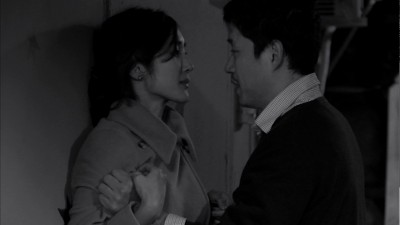
Jamie S. Rich is a novelist and comic book writer. He is best known for his collaborations with Joelle Jones, including the hardboiled crime comic book You Have Killed Me, the challenging romance 12 Reasons Why I Love Her, and the 2007 prose novel Have You Seen the Horizon Lately?, for which Jones did the cover. All three were published by Oni Press. His most recent projects include the futuristic romance A Boy and a Girl with Natalie Nourigat; Archer Coe and the Thousand Natural Shocks, a loopy crime tale drawn by Dan Christensen; and the horror miniseries Madame Frankenstein, a collaboration with Megan Levens. Follow Rich's blog at Confessions123.com.
|
| Popular Reviews |
| Sponsored Links |
|
|
| Sponsored Links |
|
|
| Release List | Reviews | Shop | Newsletter | Forum | DVD Giveaways | Blu-Ray | Advertise |
|
Copyright 2024 DVDTalk.com All Rights Reserved. Legal Info, Privacy Policy, Terms of Use,
Manage Preferences,
Your Privacy Choices | |||||||









